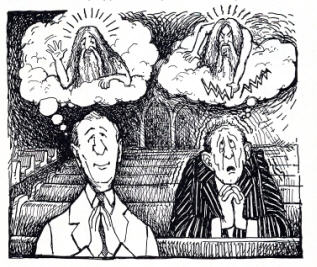"Despite the current conservative movement, images of God are in flux," says Wade Clark Roof, a sociologist at the University of Massachusetts. After a recent study conducted by the National Opinion Research Center, Roof analyzed the results of a survey concerning people's images, or concepts, of God. Respondents were presented with twelve images creator, father, judge, king, master, liberator, redeemer, friend, lover, healer, mother, and spouse and asked, "When you think of God, how likely are each of these images to come into your mind?"

From his analysis, Roof found that traditional, parental, and authoritative images were the ones most often selected. Creator was the most prominent image, chosen by eighty-two percent of the more than fifteen hundred respondents. Yet Roof believes that people's images of God are becoming "more individual, intimate, and softer." The image of God as friend was indicated by sixty-two percent, and almost half of the respondents said they sometimes imagine God as lover.
"People are reaching out for more personal images of God," says Roof. And from the viewpoint of the Vedic scriptures of India, this inclination can be considered quite natural. Since we are all persons, we require personal relationships. And a personal relationship with God provides one with an eternal and unbreakable companionship, one that continues forever, under any circumstance.
Surprisingly to Roof, many conventionally religious persons chose "more personal, less traditional, and softer" images of God. Obviously, this implies that traditional images of God are not "soft." But a Krsna conscious person recognizes that any understanding of God that does not include His personality, or "softness," is incomplete. An impersonal, limited image of God will never satisfy the mind of one who is truly religious.
From the Vedic scriptures we learn that the actual image of God is complete in every respect. God is not a concept subject to our imagination. Nor is He bound by any of the inebrieties that accompany every mortal's capacity to conceive of Him. Yet He is a person the supreme person. Quite clearly, the roles of creator, liberator, and so forth directly imply an intelligent person who is performing these roles. But who is God, and which roles does He perform?
The Vedas assert that God, being omnipotent, manifests Himself through an unlimited variety of roles and activities. Yet although He executes all the functions of universal administrator, He remains situated above the universe. The universal manifestation springs from His creative potency, yet He remains separate from this manifestation as the Supreme Potent. And in His topmost feature as Sri Krsna, He engages in a countless variety of loving relationships with His pure devotees.
The Vedic literatures, specifically the Bhagavad-gita and Srimad-Bhagavatam, inform us of the innumerable functions and aspects of the personality of Godhead. They teach us that there is, so to speak, a feature of God for everyone. For those who desire to visualize God as friend, Krsna issuhrdam sarva-bhutanam, the best friend of everyone. For those who prefer to see God in a parental role, Krsna explains, aham bija-pradah pita: "I am the seed-giving father of all living beings." And for anyone who, upon hearing these descriptions, comes to understand the actual truth of God's glory, Krsna promises, "He does not take his birth again in this material world but attains to My eternal, spiritual abode."
